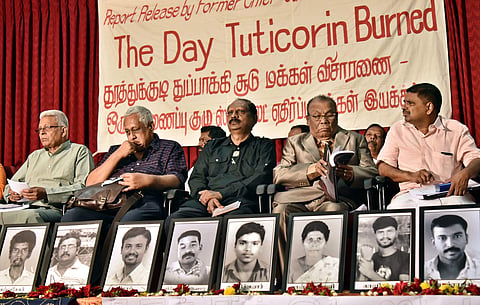

CHENNAI: ‘The Day Tuticorin Burned’ and the days following it has been documented in a five-volume-report, which was released on Sunday at the Loyola-ICAM College of Engineering and Technology.
A coalition of civil society organisations and individuals, under ‘Coordinating Committee for People’s Inquest into Thoothukudi Police Firing’ was set up to organise an independent people’s inquest into the firing on May 22 and 23.
Henri Tiphagne of People’s Watch, speaking at the release, said, “These books could not be printed in Sivakasi because the State administration did not allow material related to Sterlite to be printed. It was finally photocopied.”
The 23-member committee comprised activists, members of the judiciary, senior journalists and medical experts including Justices BG Kolse Patil, the former judge, Bombay High Court and Hariparanthaman, the former judge, Madras High Court, Christodoss Gandhi, former Additional Chief Secretary, Tamil Nadu and MG Devasahayam, former Chief Secretary, Haryana.
The report brought out various instances of how the State could have had a hand in the violence that ensued after the protests.
The imposition of Section 144 at 8 pm on May 21 was not known to the public in most areas of Thoothukudi with the only channels of communication being late night news. Given that it was imposed in two police jurisdictions, there was no legal restriction for protesters to walk 14-15 km to reach the Collectorate that was left with its gates open and no effective barricades guarding it, the report found.
Allowing an assembly in one place and prohibiting it in another area close by knowing that the rally participants wanted to march towards the Collectorate appear to have been a strategic blunder which made Section 144 practically unenforceable, it observed.
Suggesting a more direct involvement of the State, the report referenced witnesses who said that they saw some persons wearing white shirts and khaki pants carrying stones and later pelting them.
“As confirmed by organisers of the rally and the general public, there were attempts to target individuals who had organised the rally on the 100th day of protest,” the report said.
Several eye-witnesses at the rally allegedly testified to having seen snipers climbing on to vantage points on rooftops and police vehicles to take aim at rally participants. While it was alleged that extremists had a hand in the outcome, the report of the SP seeking imposition of prohibitory orders did not mention any external extremist or violent organisation is active in the area.
All five volumes of the report can be accessed online at https://peoplesinquest.wordpress.com.
Key attendees
AWD Tilak, president of Thoothukudi Bar Association and convener of the People’s Inquest Committee, advocate Geetha Ramaseshan, president of Vanikar Sangangalin Peravai Vellaiyan were also present